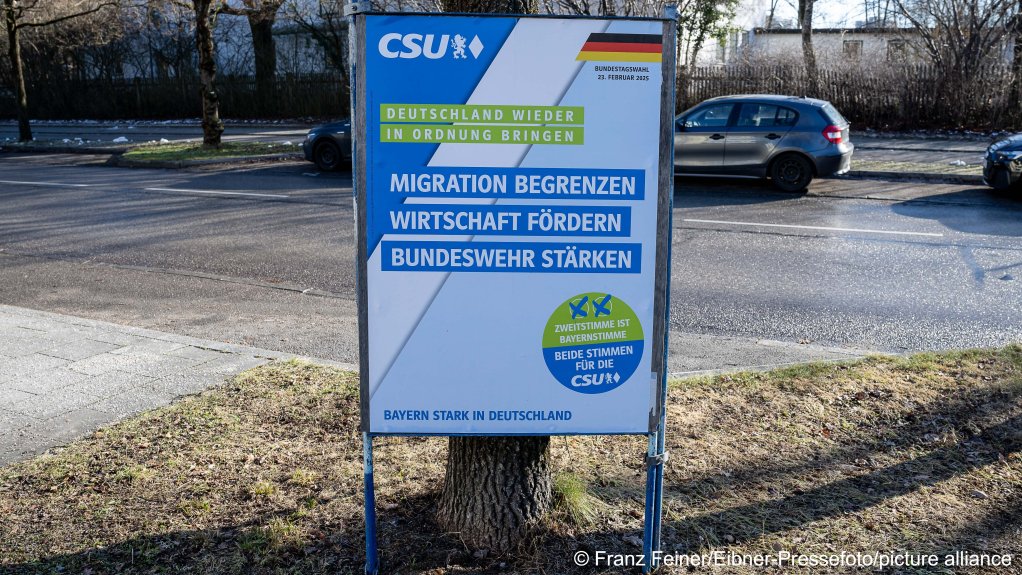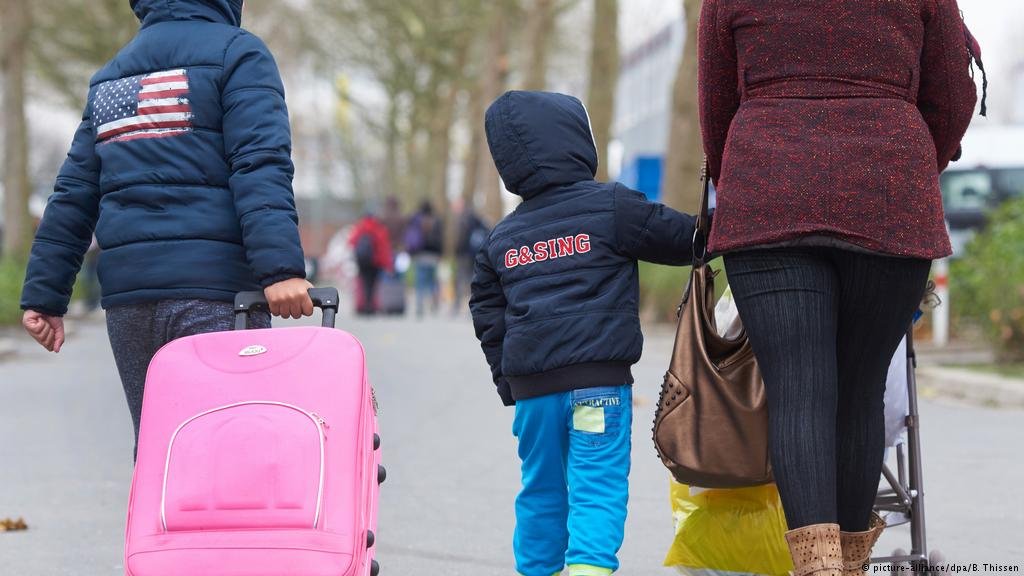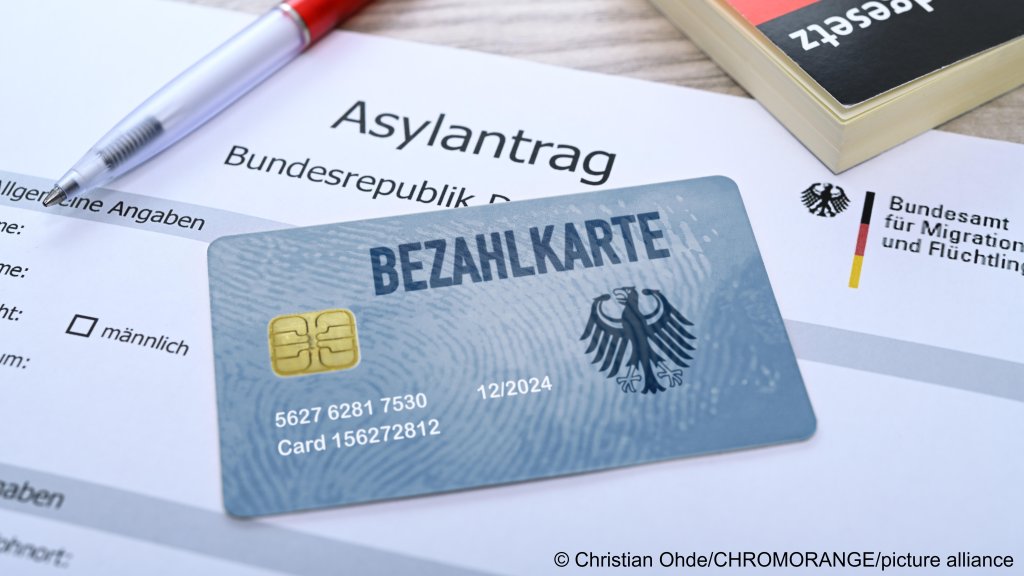With snap federal elections slated for February 23, InfoMigrants takes a look at the election manifestos of Germany's top seven political parties in terms of migration. Today we look at the center-right CDU/CSU, which demands a "de facto immigration freeze".
For the 2025 federal elections, InfoMigrants takes a closer look at where the CDU/SCU and Germany's other top six political parties stand on migration and asylum policy: The Left party, the Social Democrats (SPD), the Greens, the Free Liberals (FDP), the Alternative for Germany (AfD) and the BSW.
For many voters in Germany, migration is the most important issue in this year's election campaign: According to a poll from earlier this month, it tops the list for 37 percent of the electorate, ahead of the economy and international conflicts.
Events inside and outside Germany have intensified the topic still further. The deadly Christmas market attack in the city of Magdeburg, carried out by a man who had refugee status in Germany, which followed on from several knife attacks carried out by migrants in 2024, led more voters to call for stricter policies and tighter controls, all parties responded and rolled out tougher policies.
The fall of Syrian dictator Assad has also intensified the debate around immigration and asylum, as Germany hosts one of the largest Syrian refugee and asylum seeking populations in Europe. The debate over whether or not those people could and should now go home is also preoccupying politicians and the electorate.
The Christian Democrats (CDU) and its Bavarian sister party CSU, which together form the so-called Union, seek a "fundamental shift in migration policy" and a definitive break with the Angela Merkel era. Merkel served as Germany's Chancellor from 2005 to 2021. Her more open-door approach to asylum meant that in the years following 2015, around 1.3 million asylum seekers arrived in the EU.

Merz has commented more recently on that era, saying: "We also made mistakes during our time in government -- and learned from them."
Competition on the right
The CDU/CSU's traditionally stable position on the center-right of German politics is also being somewhat threatened by the recent gains made by the AfD (Alternative for Germany) in regional state elections.
The AfD's success, they are currently polling around 20 percent ahead of the February vote, has meant that the CDU/CSU appear to be adopting some even tougher positions regarding migration, in the hope perhaps of winning over voters being attracted by the bold claims of the AfD.
Here's a non-exhaustive summary of what the CDU/CSU, which currently tops approval ratings and is expected to gain a mandate to lead a new government coalition, have planned on the theme of migration.

'De facto immigration freeze'
In their 82-page election manifesto, the Union promises what it calls an "immediate de facto immigration freeze" in addition to existing border controls, which the two parties want to "extend as long as necessary".
The freeze means rejecting people who try to enter Germany irregularly at one of the country's nine land borders and hope to claim asylum.
At the same time, the Union says Germany will continue to fulfill its "humanitarian responsibility" and "grant protection and residence" to those "in need of protection as part of a quota solution."
In other words, the center-right parties want to enforce a binding limit for the number of asylum seekers Germany takes in. This explicitly does not apply to foreign skilled workers, for whom the CDU/CSU intend to establish a "work-and-stay" agency as a one-stop shop for recruitment, job placement, checking entry requirements, issuing visas and residence permits.
To achieve its overarching goal of "stopping illegal migration," the conservative sister parties say Germany's national asylum system needs "swift procedures, secure identification and consistent implementation of asylum decisions."
Some politicians within the union, like Jens Spahn, a former health minister under Chancellor Angela Merkel, said that anyone who had crossed through "safe third countries" to reach Germany, which would arguably be the majority of those arriving via the land routes, should be automatically refused asylum at the borders and sent back.
Denying people the right to apply for asylum at Germany's borders, like Finland and a few other EU countries have already done, is highly controversial as the right to asylum is enshrined as a basic right in Germany's constitution.
Read AlsoAre tough migration rules proposed by Bavaria's CSU legal?
Family reunification
The CDU/CSU wants to furthermore put a moratorium on family reunification for those with subsidiary protection.

In Germany, subsidiary protection is a form of international protection granted to asylum seekers that applies to people who are not recognized as being entitled to asylum or refugee status.
Jens Spahn, one of the CDU's leading politicians, told the broadcaster RedaktionsNetzwerkDeutschland (RND) earlier this week that he believed family reunification should be stopped completely. "Our society is at its limits," said Spahn. When asked if he really meant stopping all family reunification processes, he replied, "Absolutely, completely."
In 2023, Germany handed out 130,000 family reunification visas, the majority, reports RND, went to families originally from Syria, Turkey and India. The figures from the German Foreign Ministry are not yet available for 2024.
According to its manifesto, the Union also intends to end all voluntary return programs, some of which have been around for decades.
Faster asylum process, more deportations
To achieve its goal of speeding up asylum proceedings and returning more rejected asylum seekers, it's the Union's stated plan to declare more countries 'safe countries of origin'. It moreover intends to strengthen repatriation deals with the main countries of origin, some of which have proven to be difficult and ineffective.
For those obliged to leave the country, the CDU/CSU wants to align social benefits with the principle of "bed, bread and soap" -- the absolute minimum, in other words. "Wherever possible," the Union also advocates for a complete exclusion of benefits and using in-kind services over cash benefits.
The sister parties moreover want to deport people on a "regular basis" to Afghanistan and Syria -- convicted criminals and anyone considered dangerous in particular. To that end, what it calls federal departure centers ("Bundesausreisezentren") are to be established.
Deporting migrants who committed serious crimes in Germany to Taliban-ruled Afghanistan resumed last August after a three-year break, with the outgoing government announcing further returns.
Payment cards instead of cash

The controversial payment card for asylum seekers, implemented to try and prevent asylum seekers sending cash home to others and then requiring more help to continue their lives in Germany, is currently being rolled out across all of Germany's 16 federal states. The CDU/CSU are in favor of the wide-spread use of this card but underline that they want the cards to be used to restrict cash access to those who are in possession of them.
Moreover, newly arriving refugees from Ukraine should only receive services from the Asylum Seekers' Benefits Act and are expected to seek employment more quickly. Some politicians have used the example of the higher Ukrainian employment rate in neighboring countries such as the Netherlands, to underline that Germany might not need to hand out benefits for so long to all communities, if it made getting a job more of an expectation and an easier task to accomplish.
Read AlsoGermany: How much welfare do asylum seekers get, and is it a 'pull factor'?
Revoking citizenship for dual nationals convicted of crimes
When it comes to citizenship, the Union first and foremost wants to revoke parts of Germany's reformed citizenship law, which came into force last year, particularly the new rules around naturalization and dual citizenship.
Perhaps the most controversial aim of the Union is to introduce a "law to fight extremism" that would, among other things, strip any Germans with dual citizenship of their German passport if they were to "promote the aims and actions of a terrorist organization".
Friedrich Merz, the Union's candidate for Chancellor, sparked a controversy recently when he said in an interview that revoking the citizenship would apply to all convicted criminals who are dual nationals.
Political observers say that Merz' initiative, which was directed against the aforementioned accelerated naturalization procedure, violates Germany's constitution.
Merz' suggestion was widely criticized by a number of politicians and political commentators, accusing him of discriminatory rhetoric and aligning with far-right policies, in order to win over voters.

Changes in EU law
As some of these calls by the CDU/CSU to change migration and asylum policies aren't legally possible at present, the sister parties also want to change rules at the European Union level.
In this regard, the Union is, among other things, in favor of moving asylum procedures to so-called safe third countries, after which Germany should take in a "limited contingent of people in genuine need of protection" from abroad each year.
According to the Union's election manifesto hopes, those processed in third countries who had their asylum applications accepted would be expected to stay in those countries; similar to the failed UK-Rwanda scheme. The manifesto doesn't elaborate on where those countries might be, or whether any potential partners would accept those kinds of conditions.
So far, even Italy's attempt to process asylum applications in Albania, under Italian law, with the understanding that if the asylum application is acccepted the asylum seeker would then be transferred to Italy, has so far become mired in legal challenges and has not yet been fully realized.
